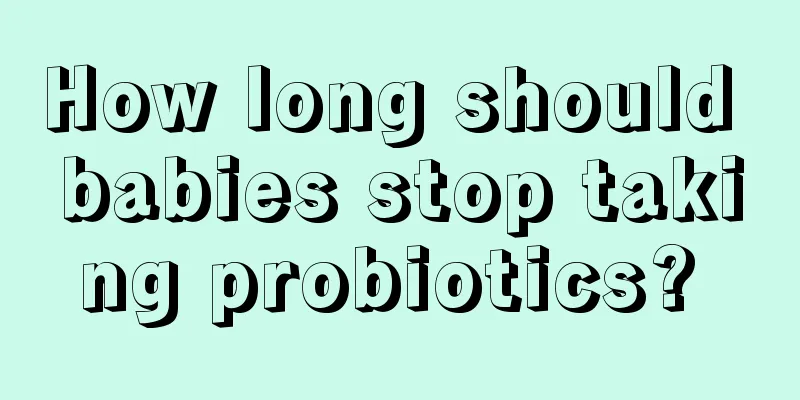How long should babies stop taking probiotics?

|
The gastrointestinal function of babies is relatively weak, and their digestive ability is relatively poor. In addition, the flora in the baby's intestines may be unbalanced, so the baby is prone to some intestinal diseases, such as diarrhea and abdominal pain. In order to prevent these diseases, parents can give their babies probiotics. Probiotics can improve the baby's digestive ability and prevent a variety of intestinal diseases. The following introduces the correct way for babies to take probiotics. How long should babies stop taking probiotics? If your baby is taking probiotics, it depends on what kind of probiotics they are. If it is a probiotic like Mami Love, then the baby should take a little when she is sick, and then stop taking it after she recovers. If the probiotics are in the form of health supplements, then generally they should be taken for about three months before there is an effect. Many babies have gastrointestinal problems such as indigestion. This is because their gastrointestinal functions are not yet perfect, so they usually need to regulate their intestines. However, some parents think that the more probiotics their children take, the better. This is a misunderstanding. So what happens if your baby eats too many probiotics? Although probiotics are bacteria that are beneficial to the human body, in theory there is no problem in eating more of them. However, each baby's physique is different, and the baby also has a certain degree of self-regulation ability, so the baby still needs to take in probiotics in moderation and not blindly take in large quantities. There is absolutely no need to supplement probiotics for growing babies, because probiotics are not health products, tonics, or panaceas. Probiotics are used in two situations: 1. Since the baby has been taking antibiotics for a long time, the antibiotics not only kill the pathogens, but also kill the probiotics that also survive, so probiotics need to be supplemented to re-establish the body's microecological barrier. 2. When babies have diarrhea, a large amount of probiotics are excreted from the body, which makes it impossible to balance the pathogens, leading to intestinal imbalance and thus causing disease. Therefore, it is necessary to supplement probiotics to rebalance the intestinal flora and maintain intestinal health. Even so, probiotics should only be taken in short periods of time under the knowledge of a doctor and should not be taken over the long term as long-term intake may pose potential harm to the human body. Medicine shows that long-term intake will cause the intestines to slowly lose the ability to reproduce probiotics, which will in turn cause intestinal dependence, which is called probiotic dependence in medicine. Once you get the disease, you will have to take artificially synthesized probiotic products for the rest of your life. To keep good health. |
<<: How long does it take from irregular uterine contractions to birth?
>>: What are the signs of childbirth in the late pregnancy?
Recommend
What to eat to prevent liver cancer? This diet is the most effective way to prevent liver cancer
Yellowing rice can actually cause liver cancer? I...
How to coordinate hands and feet in swimming
When practicing swimming, first of all, you must ...
What are the symptoms of early thyroid cancer?
What are the symptoms of early thyroid cancer? No...
Is skin cancer hereditary in women?
Is skin cancer hereditary in women? Nowadays, wit...
Can I still eat peaches if they have hair on them
Peach is a fruit with very high nutritional value...
How do you get urethritis
After suffering from urethritis, the symptoms wil...
How to treat low sperm motility?
Some male friends may experience low sperm motili...
Be careful! Low blood pressure that cannot be ignored
As a killer of physical health, hypertension has ...
The benefits of ginger and pepper foot bath
When it comes to the two spices ginger and pepper...
How to comfort a baby when he has a tantrum
When babies lose their temper, many parents get m...
What are the symptoms and signs of ovarian cancer? How long is the general survival period for patients with mid- to late-stage ovarian cancer?
Ovarian cancer is one of the most common tumors o...
How to diagnose ovarian cancer
Ovarian cancer can be said to be a relatively com...
The difference between anthocyanin and astaxanthin
Anthocyanins and astaxanthin are two substances t...
Only good treatment methods can effectively treat patients with colorectal cancer
In recent years, the incidence of colorectal canc...
At what age can the chickenpox vaccine be given
Chickenpox may appear as just a few blisters at f...









